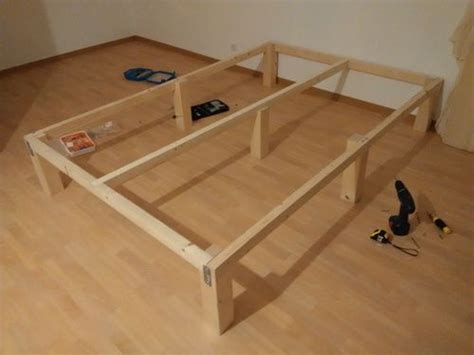If you are looking for the best way to support your bed, the answer is plywood. Plywood is a strong and durable material which can hold a considerable amount of weight when used as bed support. But just how thick should the plywood be in order to provide enough support?
Generally speaking, plywood that is at least 3/4 thick should be used for most bed frames. While thinner plywood can be used for lightweight beds, thicker plywood is ideal for heavier beds, such as those that are supporting a mattress and box spring. The 3/4 plywood is strong enough to hold the weight of a twin or full size bed without any problems.
It is important to note that the weight of the bed frame can vary depending on the materials used. For example, a metal frame may weigh less than a wooden frame, so it may require less thick plywood for support. Additionally, the weight of the mattress and box spring should also be taken into account when determining the thickness of the plywood.
In general, it is recommended to use at least 3/4 thick plywood for most bed frames, as this is strong enough to handle the weight of the bed. However, thicker plywood can be used for heavier beds or any bed frame that is made with heavier materials. Plywood of up to 1 thick can be used for beds that are heavier or for those that may be subject to a lot of use or movement.
When selecting plywood for bed support, it is important to choose a type of plywood that is of a high quality. The better the quality of the plywood, the more durable and long lasting it will be. Additionally, it is recommended to look for plywood that has been treated with a waterproof sealant, as this can help to protect the plywood from moisture and other elements.
In conclusion, plywood is the best choice for bed support and 3/4 thick plywood should be used for most bed frames. It is important to remember that thicker plywood should be used for heavier beds or those that may be subject to a lot of use or movement. Additionally, selecting a high quality plywood that has been treated with a waterproof sealant can help to ensure that the plywood will be long lasting and durable.
Understanding How Thick Plywood Should Be To Support A Bed
When it comes to understanding how thick plywood should be to support a bed, it is important to understand the load-bearing capacity of the plywood before you begin. It should be noted that the thicker the plywood, the more load it can carry. Generally, plywood that is 3/4 inch thick is considered to be the best choice for bed support.
The thickness of plywood you need to support a bed will depend on a variety of factors. The size of the bed, the type of mattress being used, and the total weight of the bed will all play a role in determining the best thickness of plywood for support. For example, if you are using a large king-size bed with a heavy mattress, you may need to use a thicker piece of plywood than what you would use for a small single bed with a lightweight mattress.
When it comes to the plywood itself, it is important to use quality plywood that is strong and durable. There are several types of plywood available, such as birch, maple, oak, and even bamboo. Each type of plywood has its own unique characteristics and strengths, so it is important to ensure that you choose the right type of plywood to support your bed.
In addition to the thickness of the plywood, the type of plywood used is also another important factor. Plywood can come in a variety of grades, such as A, B, C, and D. These grades refer to the overall strength of the plywood, with A being the strongest and D being the weakest. You should always opt for the highest grade of plywood available to ensure that your bed will be properly supported.
When it comes to understanding how thick plywood should be to support a bed, it is important to take all of the above factors into consideration. The size of the bed, the type of mattress, the weight of the bed, and the type of plywood all need to be taken into consideration. By taking all these factors into consideration, you can ensure that you choose the right plywood for your bed and that it will provide the support you need.
Choosing The Right Thickness Of Plywood For Bed Construction
When it comes to building a bed, one of the most important decisions you’ll have to make is the thickness of the plywood you’ll use. Plywood is an essential building material for any project, but it’s especially important when it comes to beds. The right thickness of plywood will ensure your bed is strong and stable enough to hold up during everyday use.
For the average bed frame, the most common thickness of plywood is 3/4. Plywood of this thickness is strong enough to support most mattresses, so it’s an ideal choice. It’s also easy to work with and generally affordable, so it’s a popular choice for bed frames. Of course, if you’re looking for something extra sturdy, you can opt for thicker plywood.
For heavier mattresses, such as those made with memory foam, a thicker plywood may be necessary. 1 plywood is suitable for heavier mattresses, and it’s also more durable than 3/4. However, it’s also more expensive and more difficult to work with. 1.5 plywood is even stronger, but it can be hard to find in stores and is usually quite expensive.
When it comes to choosing the right plywood for bed construction, there are a few factors to consider. First, consider the weight of the mattress you’ll be using. The heavier the mattress, the thicker the plywood should be. Next, think about the budget you have for the project. Thicker plywood is more expensive, so you’ll have to decide what’s best for your needs.
Finally, consider the type of bed frame you’ll be building. If you’re making a platform bed, 3/4 plywood should be fine. However, if you’re making a bunk bed, for example, you’ll need thicker plywood to ensure it’s safe and stable. Ultimately, it’s important to get the right thickness of plywood for your bed construction project to ensure your bed is strong and will last for years to come.
Table: Plywood Thickness For Bed Construction
| Mattress Weight | Plywood Thickness |
|---|---|
| Lightweight | 3/4 |
| Medium Weight | 1 |
| Heavy Weight | 1.5 |
Generally, 3/4-inch thick plywood is suitable to support a bed.
The recommended thickness for a bed frame is 3/4-inch plywood.
Yes, plywood is strong enough to support a mattress when it is 3/4-inch thick.
Thinner pieces of plywood may not be suitable for a bed frame and could result in sagging or other damage.
Plywood is an excellent material for bed frames as it is strong and durable.
Generally, 3/4-inch thick plywood does not require reinforcement for a bed frame.
Yes, it is recommended to sand plywood before using it to build a bed frame.
Yes, plywood is a safe and reliable material to use for a bed frame.
Ensure that the plywood is at least 3/4-inch thick to ensure it is strong enough to support a bed frame.
It is recommended to use birch plywood or another type of hardwood plywood for a bed frame.






